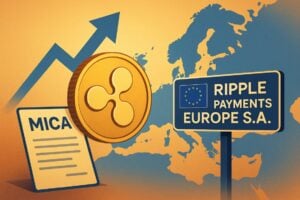Ripple aims higher and higher, announcing the intention to obtain a MiCA license to expand its presence in the European Union.
The growth prospects in the digital payments sector are enormous, especially after the strategic moves made by the company in recent months.
The decision to comply with the new regulation represents a key step to conquer new markets and strengthen credibility among European financial operators.
The weight of MiCA regulation in the crypto sector, the Ripple case
The new MiCA (Markets in Crypto-Assets) regulation enacted by the European Union aims to provide a clear and uniform legal framework for operators offering services related to digital assets.
MiCA introduces strict requirements for transparency, investor protection, and regulatory compliance. In this context, Ripple has openly declared its intention to become “MiCA-compliant,” highlighting how the opportunities in the European market are particularly significant.
Compliance with MiCA is now considered by numerous analysts as an essential factor for operating in the European financial sector.
Consequently, companies that decide to proactively adapt to the new regulation can benefit from greater trust from investors and a potential expansion of their user base.
The competitive environment is also rapidly expanding, creating space for new regulated players.
Among the most significant moves by Ripple in the recent period is the registration of the new entity Ripple Payments Europe S.A. in Luxembourg, which took place at the end of April.
The choice of this jurisdiction is not coincidental. Luxembourg has long stood out for its environment favorable to financial innovation and its ability to attract companies engaged in the digital transformation of payments.
Thanks to this legal presence, Ripple intends to strengthen the channels of dialogue with European authorities and build a solid infrastructure to offer its services in the euro area.
The landing in Luxembourg also underscores the European penetration strategy that the company is pursuing. Thus confirming a long-term vision and growing confidence in the local development potential.
Focus on digital services and the demand for licenses
According to reports from the main industry media, including Ledger Insights, Ripple has recently applied for an electronic money institution license again in Luxembourg.
However, the company did not want to comment or officially confirm this specific initiative, merely stating that at the moment “there are no updates to provide.”
This potential request, however, is part of a strategy aimed at anticipating market needs and ensuring the ability to offer regulated digital financial products.
Obtaining such a license would allow Ripple to provide more advanced digital services to institutional and private clients throughout the European Union. The goal is to offer conditions of maximum security and transparency, minimizing the risk for consumers.
The European market represents a fundamental resource for crypto companies. Its size, the strong demand for digital payments, and the growing adoption of fintech solutions make Europe an ideal scenario for those looking to expand their business.
Ripple recognizes these opportunities and aims to become a key partner for institutions and businesses active in value transfer services.
The current European regulatory scenario forces innovative companies to maintain a constant and transparent dialogue with the financial supervision authorities.
Ripple’s entry into Luxembourg and the declared goal of obtaining the MiCA license address this need.
In addition to representing a barrier to entry for less structured operators, regulatory compliance is also a tool to enhance reputation and ensure the development of more stable relationships with banks, funds, and other financial entities.
Furthermore, Ripple can benefit from collaboration with the competent national authorities, which often play a key role in the implementation of European directives.
A transparent and rigorous approach helps to speed up the licensing procedures and to consolidate the company’s presence in the various states of the continent.
Ripple and the future of digital payments in Europe
The willingness of Ripple to be fully compliant with regolamentazione MiCA represents a significant sign of maturation for the entire digital asset sector.
The approach to a clear regulatory framework not only meets the needs of institutional clients but also anticipates the increasingly stringent demands of authorities and consumers themselves regarding transparency, reliability, and security.
Initiatives such as the registration of Ripple Payments Europe S.A. and the possible application for an electronic money institution license confirm the central role of Europe in the company’s growth plans.
The goal is to consolidate the leadership position in digital payments, offering increasingly innovative and competitive solutions in a rapidly evolving market.
Consequently, Ripple seems destined to further strengthen its presence in Europe, focusing on new service models and cutting-edge technologies.
The entry of Ripple into the European landscape opens new scenarios for operators and investors seeking opportunities in the fintech and digital payments sectors.
New institutional partnerships, experimental projects, and regulated services can provide a decisive acceleration in the adoption of blockchain technologies.
Furthermore, compliance with local regulations is set to become a distinctive factor, essential for competing in an increasingly competitive and selective market.
Ultimately, Ripple’s strategy to obtain a MiCA license marks a turning point for the digital asset sector. Consequently indicating the path towards greater integration between traditional finance and technological innovation.
Operators who can quickly adapt to the new rules will benefit in terms of reputation, security, and access to an increasingly broad and diverse European audience. Ripple’s determination to adhere to MiCA regulations and expand its legal presence in Europe represents a milestone in the evolution of the digital payments ecosystem.
The future of finance, even in Europe, is increasingly linked to advanced regulation, transparency, and collaboration between operators and institutions.
Staying updated on regulatory developments and the strategies of global players, such as Ripple, will be essential to seize all the opportunities offered by this rapidly changing scenario.


